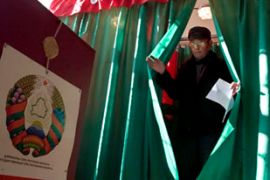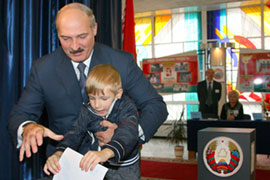Opposition angry as Belarus votes
Observers urged not to approve election which could bring concessions from the West.

About 70 opposition candidates are on the ballot – a record number – and 477 observers from the Organisation for Security and Co-operation in Europe (OSCE) are monitoring the poll.
However, the other 193 candidates are all Lukashenko loyalists and in 15 of the 110 districts the president’s allies are running unopposed.
‘Ethical dilemma’
Opposition leaders have urged the observers not to give their stamp of approval to the poll.
“The monitors face a political and ethical dilemma,” Vinchuk Vechorko, deputy head of the opposition Belarus National Front, said.
“They can carry out a political project of remaking Lukashenko into a European, nationally minded politician … or remain committed to their principles of calling a fraudulent election a fraudulent election.”
Sergei Kalyakin, leader of Belarus’ Communist party, said: “I have no doubts the polls will be falsified.”
Anatoly Lebedko, leader of the opposition United Civic Party, said Lukashenko “will tell Russia: give me good gas prices or I will walk away to Europe, and he will tell Europe: deal with me or … you will see the Russian bear at your doorsteps”.
After the poll, a coalition of anti-Lukashenko groups plan to stage a rally in Minsk’s October Square, where thousands protested the results of a presidential vote in March 2006.
‘Democratic without precedent’
Lukashenko, who has ruled the former Soviet nation for 14 years, has voiced hopes that the European Union and US will recognise the result of the election
 |
| Lukashenko has ruled Belarus for 14 years [AFP] |
“We want you to accept us, to endorse and recognise our election,” he said last week.
“We do not want to talk to you across the Iron Curtain which you have erected on the borders of Belarus.”
He promised that the vote will be “democratic without precedent” and threatened to cut ties with the West if its observers say it was rigged, as they did with previous Belarussian polls.
The EU has promised to lift travel restrictions on Belarussian leaders and offered economic aid to the ex-Soviet republic of 10 million people, if the vote shows progress towards “democratic values”.
In August, Belarus released three people viewed by the West as political prisoners, including former presidential candidate Alexander Kozulin. The opposition has also been given more access to television.
But dissidents have dismissed the moves as cosmetic in a country where the opposition is subject to arbitrary arrests and other forms of intimidation.
‘Big brother’ Russia
Belarus has been a traditional ally of Russia, which heavily subsidises Belarus’ Soviet-style economy, but has been seeking a higher price for its support.
Following Russia’s conflict with Georgia last month, which led to a deep chill in Moscow’s relations with the West, the Russian ambassador to Minsk criticised Belarus for maintaining a “modest silence” on the conflict.
Minsk has declined to follow Moscow’s lead in recognising the independence of Abkhazia and South Ossetia, the Georgian breakaway regions at the heart of the conflict.
Andrew Wilson, a Belarus expert at the London-based European Council of Foreign Relations, said the Georgia war shook up the Moscow-Minsk alliance by showing how vulnerable the ex-Soviet republics were to Big Brother Russia.
“Clearly [Lukashenko] was worried that Russia would use a kind of sphere-of-influence power in Belarus as well as in Georgia, particularly economically.”
Alexander Milikevich, a former opposition presidential candidate and leading opponent of Lukashenko, said Russia “wants maximum influence on the domestic and foreign policy of the former Soviet republics, of Ukraine, Georgia [and] Belarus.
“It would like to preserve them as satellites,” he said.
Kozulin, the recently freed prisoner and former presidential candidate, said Lukashenko had “no strategy for improving relations with the West” and was merely playing both sides “to get the maximum benefit”.
Alexander Byalyatsky, head of the Vyesna human rights centre, said: “After the election, there will be a strong wave of repression.”